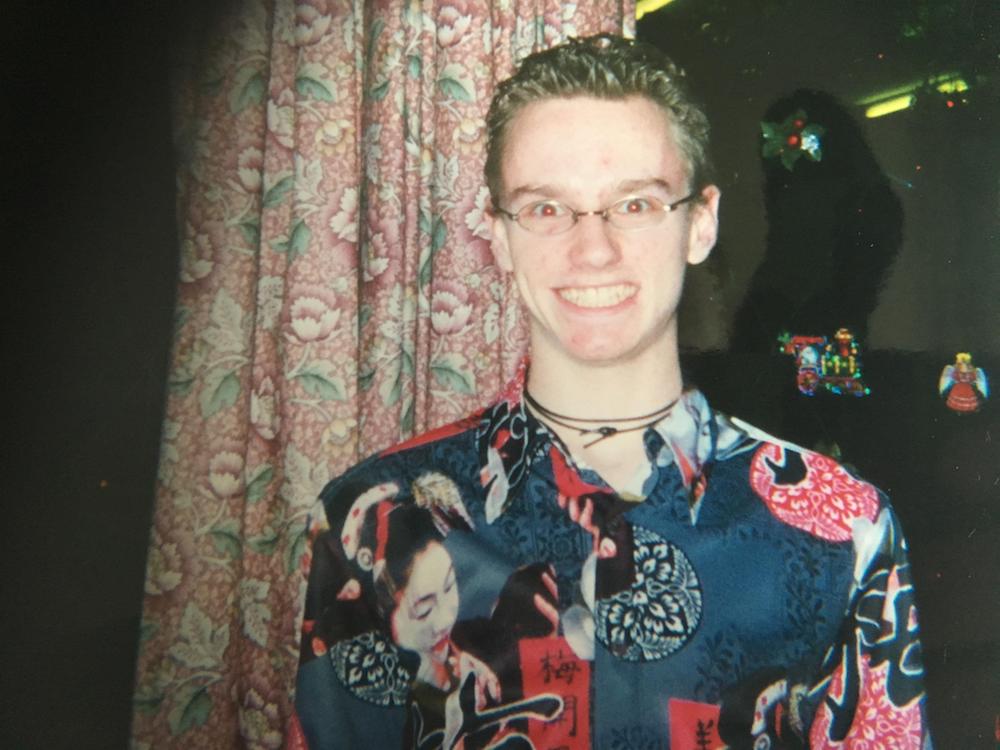Fighting For The Rights of Male Abuse Victims: Phil's story
updated on Apr 20, 2018
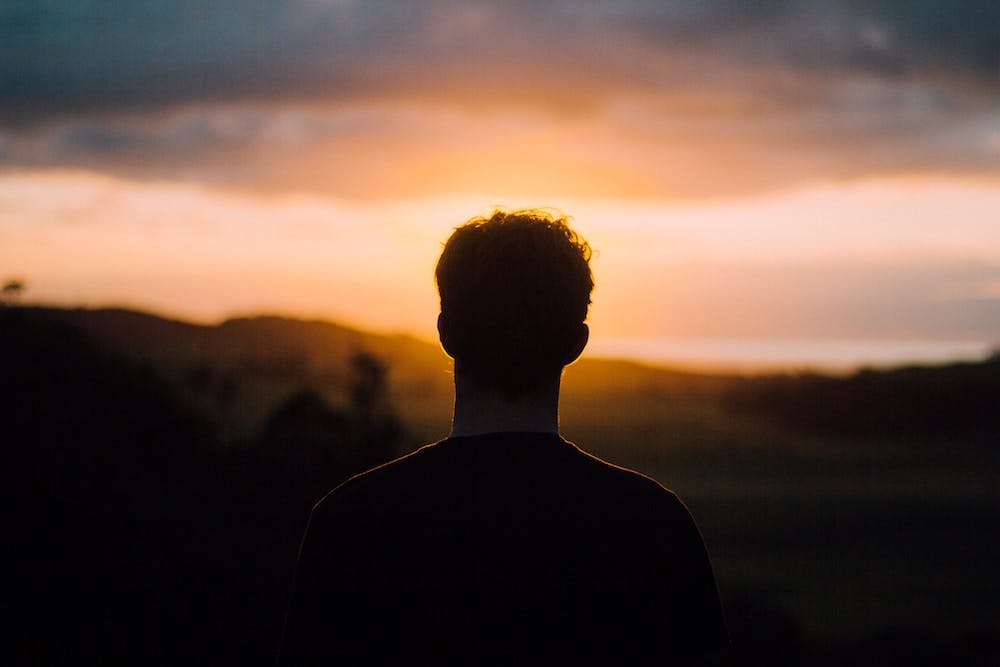
After a traumatic childhood, with bullying at school and violence at home, Phil Mitchell thought he’d found someone to rely on when, at just 16, he started dating an older man. But the relationship became abusive – something that Phil couldn’t see at the time. Now trained as a counsellor, Phil is speaking up for other boys and men who’ve been abused
Content Warning: Please be aware that this article contains descriptions that relate to sexual abuse that some readers may find upsetting.
Before the age of 21, I experienced various forms physical and emotional abuse, including violence, child sexual exploitation, and rape.
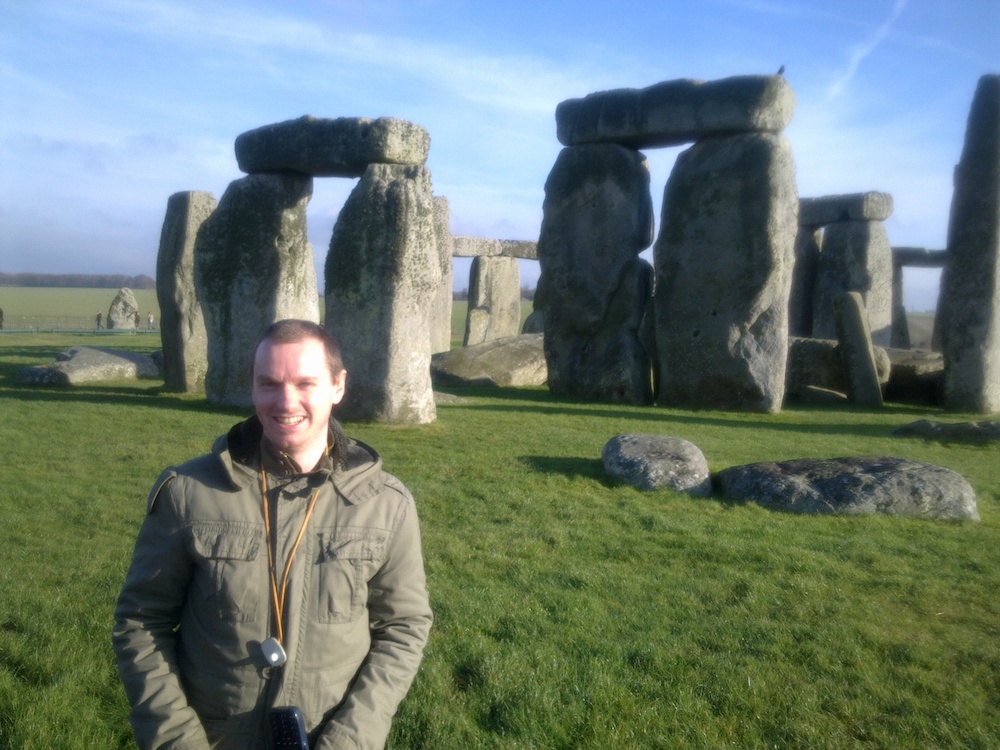
Phil Mitchel
During my adolescent years I had, to put it mildly, a very difficult time. I was violently bullied in school, I attempted to take my own life on two occasions, and I ended up being separated from the other students by being sent to work in a room on my own.
I eventually joined a youth group for young LGBT+ people. At first I thought this was pretty amazing, however, after the group meeting was over, many of us would go to a local, trendy gay bar. We thought we were pretty grown up, and no one told us that being under 16 and frequenting these venues was a problem. I now look back and realise that the lack of boundaries was a contributing factor in what happened to me.
In the bar I would see other boys, all aged under 18, being chatted up by men in their 50s. This seemed to be “the norm”. One of the boys, who I shall refer to as Tom, was quite open about the fact that he was being paid by older men to have sex with them. I remember changing my mind from seeing Tom as a “dirty prostitute”, to a genius who was killing two birds with one stone by getting loads of sex and loads of money. A few months later, I found out that Tom had been paid for sex by a man who abused him, and later murdered him.
A child who feels unloved will endure large amounts of abuse for a small amount of love
I eventually met an older man – I’ll call him Mike – in the bar. He was an attractive man, and in his late 20s or early 30s.
He presented himself as a confident, successful charmer, and I fancied him straight away. At this point – I was 16 – I’d left home after experiencing violence, and was living in a bedsit. I’d given up going to college, and was working full-time in retail to pay my rent.
When I met Mike, I told him about the violence I’d experienced at home and school, and he instantly empathised. Not only did he understand my situation, he flirted with me and made me feel attractive and good about myself. This was one of the few times in my life that someone helped to put a smile on my face.
Mike started coming round to my bedsit, buying me presents, paying me compliments and making me feel loved and accepted. We’d play games on my PlayStation and cuddle up watching TV together.
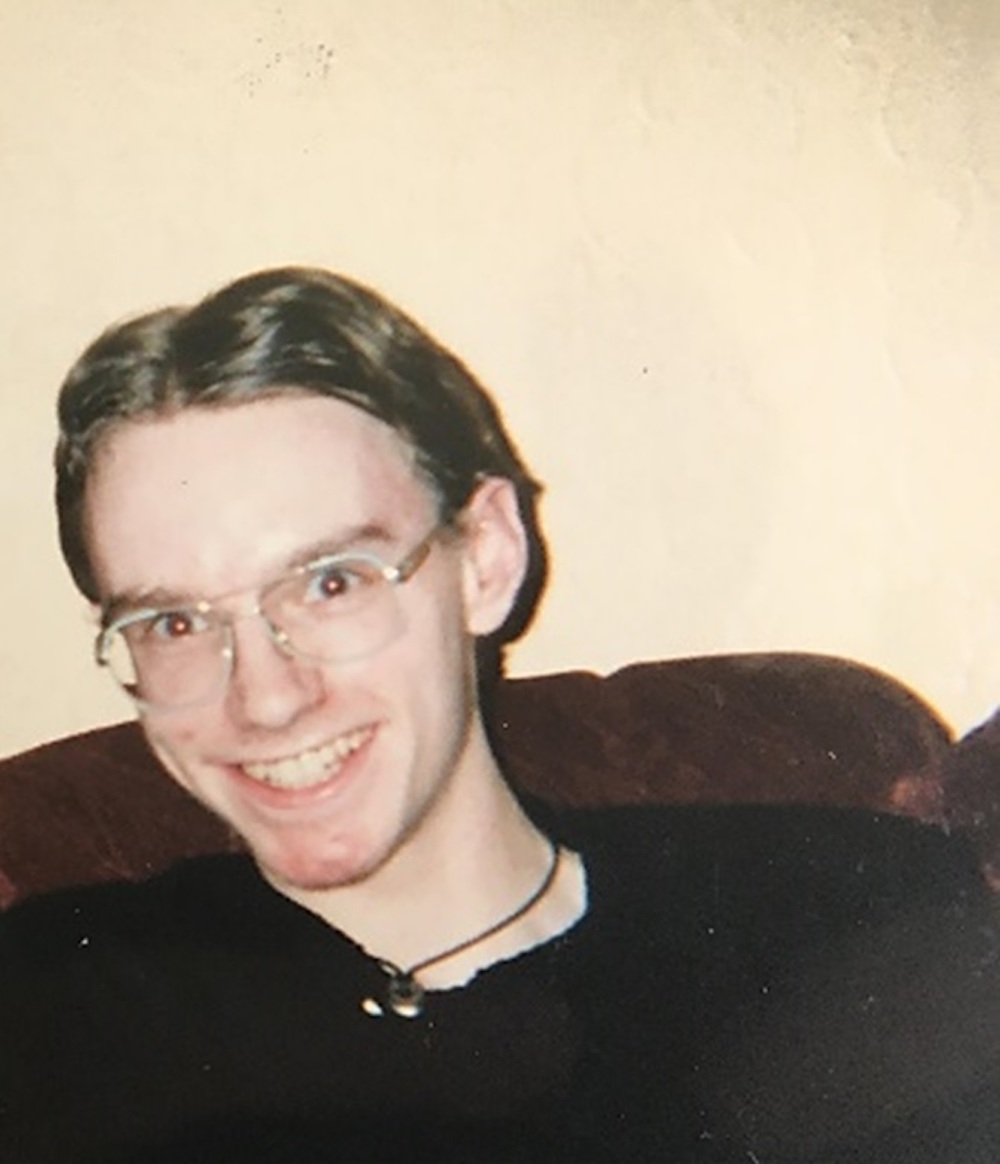
Phil as a teenager
But it wasn’t long before Mike started turning up with other men; men who I had never met before. He would text me saying he was outside my front door and that he had a surprise for me. I responded with surprise and uncertainty when I answered the door and saw him standing there with an unknown male in his 40s. He introduced the man and said that he liked playing the same PlayStation games as me. I thought it was a bit weird and, to be honest, a bit rude, but I didn’t want to rock the boat. I thought that I’d done well to end up with such a handsome and successful boyfriend, so why would I do anything to ruin that?
Mike brought four men round on four separate occasions, and he pressured me into giving all of them oral sex. At the time, I remember it feeling very weird, but Mike was an amazing manipulator. He told me that it was normal to have lots of sex and that it was just a bit of fun. He told me how I should be grateful because: a) he was my boyfriend allowing me to have sex with other men; and b) these men were interested in me and no one else.
Mike would occasionally get aggressive, but never violent. None of the men were ever violent. I remember my heart beating fast and feeling all the blood rush from my stomach to my limbs as I was performing oral sex, or as I now see it, being abused. Mike told me that those feelings were normal. I didn’t recognise what was happening to me as abuse. I wasn’t being hurt or violently forced into performing sex. Yes, I was being pressured, but I didn’t think that was abuse. I remembered what happened to Tom, but Mike told me that I had him to look after me and that Tom had no one. He also said that Tom was being paid for sex and that I wasn’t, so it was a completely different situation.
I didn’t want to have sex with any of these men, but I went along with it to keep Mike happy. People ask: “Why did you put up with it?” The answer is simple. I was a child and he was an adult. At the time, I didn’t think Mike was treating me badly. He was giving me everything I’d ever wanted and that I’d never had before – love, acceptance, happiness, support, understanding. The problem was that I didn’t get any of that without emotional blackmail, mind games and pressure that resulted in sexual abuse. A child who feels unloved will endure large amounts of abuse for a small amount of love. I didn’t really know what abuse was, and I didn’t know that Mike’s fake displays of affection weren’t real love.
Phil
I didn’t tell anyone what was going on at the time. Part of me knew it was “weird”, but I wasn’t really sure what I would say. The last man Mike brought round was a bit rougher than the others, and when I said stop, he laughed and said: “Oh he wants me to stop.” That’s when I knew I had to get out of the situation.
I acted differently with Mike – becoming more distant with him. I cut off communications; I stopped texting him, and didn’t respond to his calls or messages. I suspect he knew that I was angry and upset because he stopped trying to get in touch. A few months later, when I was feeling lonely, I tried to contact him but he had changed his number.
Fast forward to a few months before my 21st birthday, and I was on a night out. A drunken me ended up wandering off and meeting a man who I believed was a bouncer. He said he would help me into a taxi, but he ended up taking me to a bridge and forcing me to give him oral sex. I’m often asked, why did I tell the police (who responded by blaming me) about the bouncer, but not about what happened with Mike? I saw both incidents as completely separate with nothing in common. It was only during my counselling training that I realised I had been abused by Mike and the bouncer, just in different ways.
I find that perceptions around masculinity, gender stereotypes, and people’s ideas on what it means to be male, often feature in therapy sessions
After a lifetime of abuse – from being bullied in school, to beaten up at home – I tried to take my own life. I then sought counselling. It was only after I was raped that I started to think about my abuse at the hands of Mike. I had seen them both as completely different situations, but I realised they were both sexually abusive with lots of power and control. Once I realised that the situations had a lot more in common, I started to accept that I was abused as a child.
I now work as a counsellor/psychotherapist, with a specific focus on boys and men affected by recent or historic rape, abuse and sexual exploitation. I find that perceptions around masculinity, gender stereotypes, and people’s ideas on what it means to be male, often feature in therapy sessions. My job is to explore this with the client, identify how it may be acting as a barrier to positive change, and help the client develop a healthier perception of masculinity.
Working with boys and men, and their ideas about what it means to be male, can present an added challenge. I didn’t tell anyone what happened to me as a child, even when I realised it was abuse, because of the bad experience I’d had of disclosing rape to the police, and I partly believed men should just “man up”.
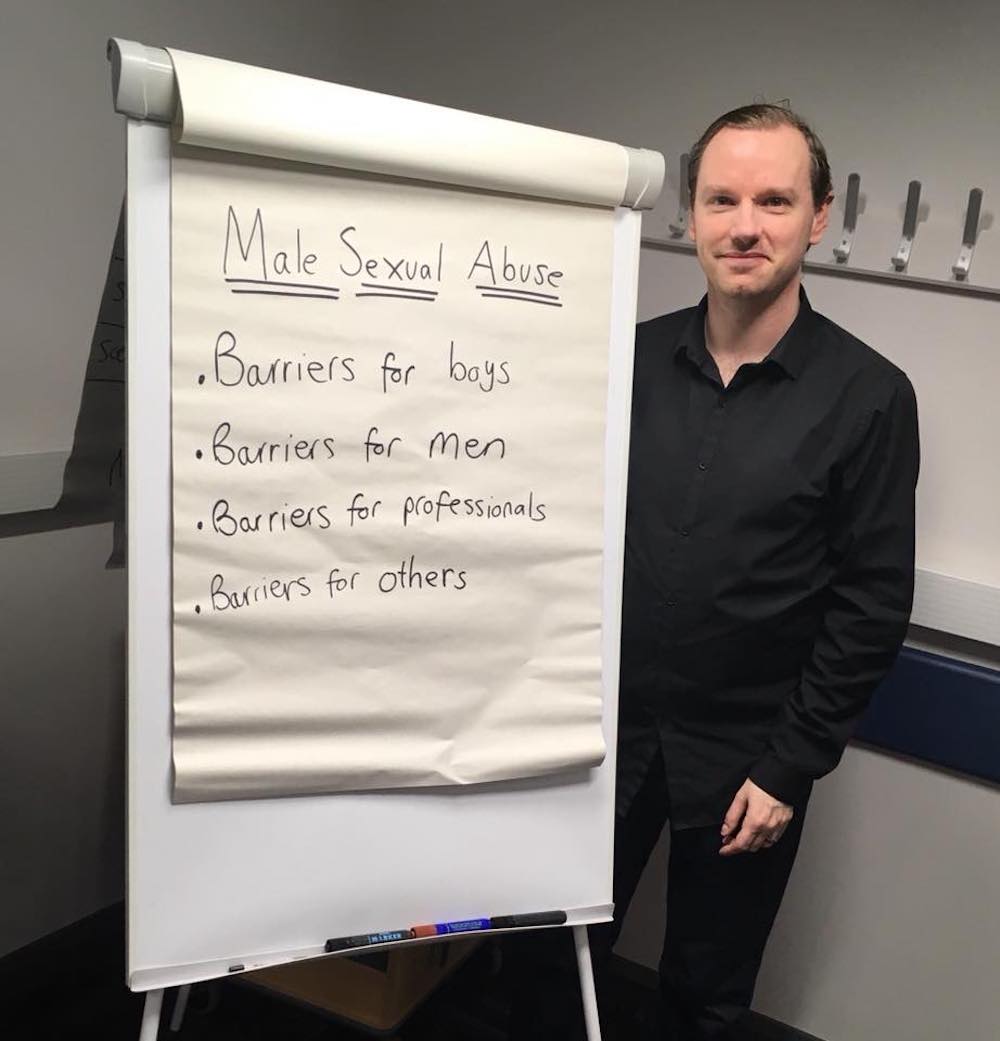
Phil at work
It’s important to not blame victims for the abuse they’ve suffered. We need to understand the situation from their point of view, not our’s.
The first time I shared my story, I felt very nervous, as people I’d worked with for years had no idea what had happened to me, but it also felt incredibly empowering. Moving forward, I will continue to raise awareness of, and tackle, the sexual abuse and exploitation of boys and men.
I have recently started talking about my experiences publicly, have contributed to various publications, and featured in a number of documentaries – most recently BBC’s documentary Male Rape: Breaking the Silence. I also deliver training across the country, addressing male abuse, and supervise therapists working with abused children and adults.
Everyone’s experience is so unique, but I would encourage all boys and men to talk more. A lot of males think they have to “man up”, but I have a saying: man up means shut up; shut up means bottle up; bottle up means put up (or put ’em up); and then eventually you f*ck up. Don’t man up – speak up.
You can find out more about Phil and his practice at counsellingwithphil.co.uk. Phil will be sharing his story throughout April across locations in Yorkshire – find out where he’s speaking at counsellorinleeds.co.uk
As Phil makes clear, a person who is abused is never to blame. Abusers are manipulative and invalidating, enabling their abuse to continue. Phil’s account shows the importance of trusting our own instinct; if something feels wrong, pay attention to that feeling. I hope that others can be empowered by what Phil has shared, and find ways to speak their truth and find freedom from the power of abuse, both past and present.

Join 100,000+ subscribers
Stay in the loop with everything Happiful

